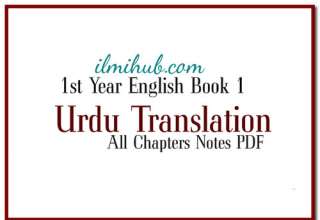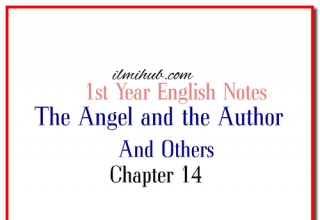11th Class English Chapter 10 A Mild Attack of Locusts Short Questions and Answers
This post contains, A Mild Attack of Locusts Questions and Answers for FA, FSC Part 1. This short story is lesson 10 in the textbook of Class 11. This short story is written by Doris Lessing. The story theme is about the attack of Locusts and the efforts of farmers which they make to save their fields. If you are a student of FSC, 1st year and you need question answers of other short stories too, you can visit this link. I have also shared a post with complete 1st year English Notes.

Introduction – A Mild Attack of Locusts Summary for 1st Year Students
This story shows man working against the heavy odds of nature against him. The fact becomes clear that the power of human beings is no match for the power of Nature. We learn that before Nature, human beings are helpless. Man’s optimism makes him great and going.
In the story, crops are attacked by a large swarm of locusts. The farmers make a noise, light fire to produce acrid and black smoke. But the locusts destroy everything, leaving no blade of grass behind. The farmers, instead of losing heart, plan for the coming days which makes them great in the readers’ eyes. There is no blinking the fact that defeat never comes to a man until he admits it.
11th English Chapter 10 Questions and Answers from Textbook Exercise
Hereunder, you will see 10 questions with answers of the short story, the mild attack of locusts and 11 Question Answers from Kips English Notes.
Q.1 What are locusts?
Ans. Locusts are large insects that fly in large groups. They live in hot countries and destroy crops.
Q.2 Why did the farmers throw wet leaves on fire?
Ans. They threw wet leaves on fire to make the smoke acrid and black so that the locusts might be kept from landing on their farms.
Q.3 What was the desire of every farmer?
Ans. Every farmer hoped that the locusts would overlook his farm and go on to the next farm.
Q.4 Did Margaret know what to do to keep the locusts away?
Ans. No, she did not know anything to keep the locusts away. She was wondering what to do to help them.
Q.5 What was the condition of the trees?
Ans. All the trees were queer and still. They were clotted with insects. Their boughs weighed down to the ground.
Q.6 How did old Stephen treat the stray locusts?
Ans. He picked the stray locust off his shirt and split it down with his thumbnail. It was filled with eggs.
Q.7 Are the hoppers different from the locusts?
Ans. No, not at all. The hoppers are not different from the locusts as they are the young ones of locusts. They are identical to them.
Q.8 Did Margaret lose heart on the loss of crops?
Ans. Yes, she lost heart on the loss of crops. She thought that it was bad enough. She thought that the devastated and mangled countryside was a ruin.
Q.9 Why are the locusts compared to bad weather?
Ans. Locusts are compared to bad weather because they are as disastrous as bad weather. Both have harmful effects on crops.
Q.10 Why did the men eat their supper with good appetites?
Ans. The men ate their supper with good appetites because they were satisfied with their work. They were not much worried. According to them, the situation could have been much worse.
Additional A Mild Attack of Locusts Short Questions with Answers from Kips Notes
Here are additional 11 Questions with Answers from 1st Year English Chapter 10 A Mild Attack of Locusts. Students should go through these short questions too.
Q.1 How did the farmers try to prevent the main swarm of locusts from landing on their farms?
Ans. The farmers tried to prevent the main swarm of locusts from landing on their farms by raising smoke, beating old bits of metal, and making much noise.
Q.2 Why did the men, even after all the crops were destroyed, continue to fight the swarm?
Ans. They were trying to prevent the main swarm from setting and laying eggs so that the hoppers, later on, might not create more destruction.
Q.3 What was the condition of the lands when the locusts had moved to the south?
Ans. When the locusts had moved to the south the lands looked devastated and mangled. There was not a blade of grass left on the farm.
Q.4 What did the farmers see over the rocky levels of the mountains?
Ans. Over the rocky levels of the mountains, they saw a streak of rust-coloured air. They were actually locusts.
Q.5 What was the use of the old ploughshare?
Ans. The old ploughshare hanging from a tree branch was used to summon labourers at moments of crisis.
Q.6 What was the condition of the farm?
Ans. The farm was ringing with the clamour of the gong and the labourers could be seen pouring out of the compound. Smoke was rising everywhere.
Q.7 How did the main swarm show?
Ans. The main swarm showed in a dense black cloud, reaching almost to the sun itself while the front guards of the swarm looked like reddish veils.
Q.8 How did the earth seem under locusts?
Ans. The swarms of the locusts had covered the farm-land. The locusts were crawling everywhere so the earth seemed to be moving.
Q.9 What was the condition of the evening air?
Ans. The evening air was no longer black and thick. It was clear blue with a pattern of insects whizzing through it.
Q.10 What did Richard do when he saw locusts coming?
Ans. On seeing the locusts, Richard, at once, called the cook boy and sent him to beat the old ploughshare in order to summon all the labourers at this moment of crisis.
Q.11 Why was the main swarm not setting?
Ans. The main swarm of locusts was not setting because they were looking for a place to settle and lay eggs.
You may also Like:
- 1st Year Book-I All Short Stories Notes
- The Gift of the Magi Question Answers
- The Piece of String Question Answers
- I Have a Dream Question Answers





